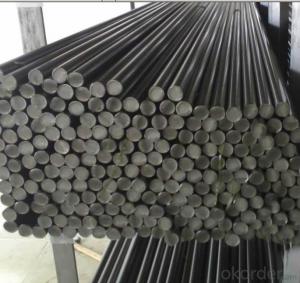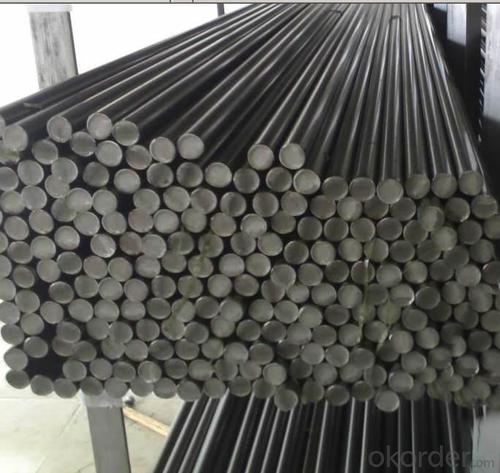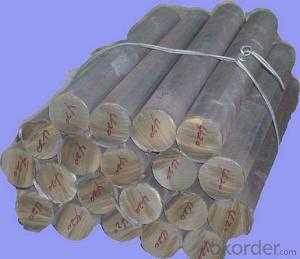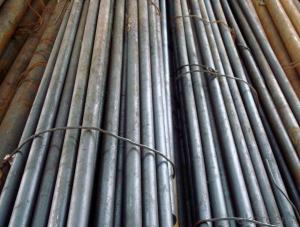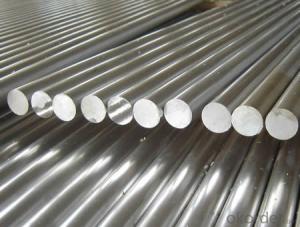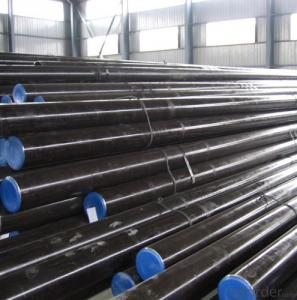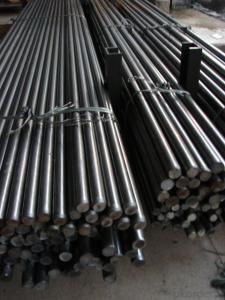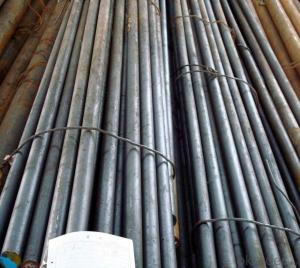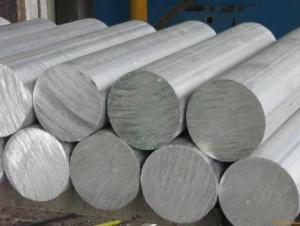High Quality Spring Steel Round Bar 12-16mm
- Loading Port:
- China main port
- Payment Terms:
- TT or LC
- Min Order Qty:
- 100 m.t
- Supply Capability:
- 10000 m.t/month
OKorder Service Pledge
OKorder Financial Service
You Might Also Like
High Quality Spring Steel Round Bar 12-16mm
Product Description:
Spring Steel can be divided into two types. One is carbon spring steel, and other one is alloy spring steel.
Alloy spring steel is based on carbon spring steel, by adding one or more alloying elements to improve the mechanical properties, hardenability and other properties to meet the requirement for manufacture all kinds of spring steel.
Specification of High Quality Spring Steel Round Bar 12-16mm:
-Material: 1065
-Standard: ASTM
-Production: Hot rolled or cold rolled
-Type: Spring Steel
| Diameter(mm) | Mass(kg/m) | Section(mm2) |
| 12 | 0.888 | 113.04 |
| 15 | 1.39 | 176.625 |
| 16 | 1.58 | 200.96 |
Corresponding Steel Grade of High Quality Spring Steel Round Bar 12-16mm for Reference:
USA, ASTM | CHN, GB/T | JPN, JIS | ISO |
1065 | 65 | SWRH67A SWRH67B | Type SC Type DC |
FRA, NF | GBR, BS | ||
C66D | C66D |
Chemical Composition of High Quality Spring Steel Round Bar 12-16mm:
C | Mn | Ni | Si |
0.62~0.70 | 0.50~0.80 | ≤0.30 | 0.17~0.37 |
P | S | Cr | Cu |
≤0.035 | ≤0.035 | ≤0.25 | ≤0.25 |
Mechanical Properties of High Quality Spring Steel Round Bar 12-16mm:
-Tensile Strength σb (MPa): ≥695
-Yield Strength σs (MPa): ≥410
-Elongation δ10(%): ≥10
-Percentage reduction of area: ψ (%): ≥30
-Hardness HBS, no heat treatment: ≤255
Usage/Applications of High Quality Spring Steel Round Bar 12-16mm:
-ASTM1065, is medium-high carbon spring steel. After heat treatment, this type of steel obtains high strength, hardness and elasticity but this material isn’t perfect for welding.
-Its fatigue strength is equal to alloy spring steel when they are in same configuration.
-For manufacturing spring, spring circle, all kinds of grommet, clutch, and axels in the production of normal machine.
Packaging & Delivery of High Quality Spring Steel Round Bar 12-16mm:
-Packing Detail: The products can be packed in bundles by steel wires.
-Marks: There are two types of marks. One is color mark and other one is tag mark. We paint color marks on both ends of bundles to make sure that it’s more convenient for customers to distinguish their products from other products at the destination port. The tag marks will be tied up to each bundle to make sure that customers know the specifications of each bundle like product’s name and size and other information of products.
-Delivery Detail:
1, Delivery time: 30~60 working days after receive buyer’s T.T. or L/C.
2, Delivery status should be written in the contract. (Heat treatment or no)
FAQ:
Q1: Why buy Materials & Equipment from OKorder.com?
A1: All products offered byOKorder.com are carefully selected from China's most reliable manufacturing enterprises. Through its ISO certifications, OKorder.com adheres to the highest standards and a commitment to supply chain safety and customer satisfaction.
Q2: How do we guarantee the quality of our products?
A2: We have established an advanced quality management system which conducts strict quality tests at every step, from raw materials to the final product. At the same time, we provide extensive follow-up service assurances as required.
Q3: How soon can we receive the product after purchase?
A3: Within three days of placing an order, we will arrange production. The shipping date is dependent upon the quatity, how many sizes you want and the plan of production, but is typically 1 month to 2 month days from the beginning of production.
Images of High Quality Spring Steel Round Bar 12-16mm:
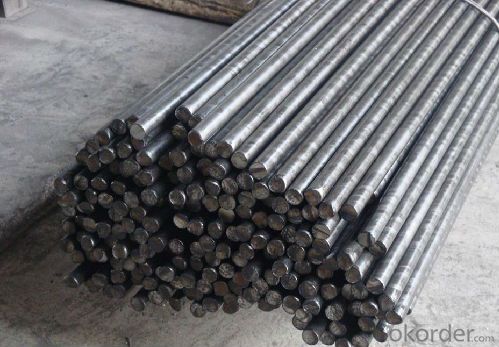
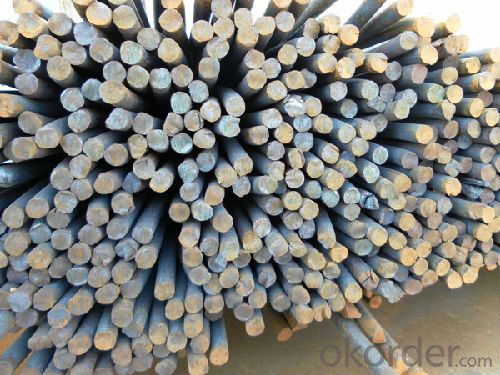
*If you would like to get our price, please inform us the size, standard/material and quantity. Thank you very much for your attention.
- Q: What are the applications of special steel in the food processing industry?
- Due to its unique properties and characteristics, special steel finds wide-ranging applications in the food processing industry. One significant use of special steel in this sector is for manufacturing equipment and machinery used in food processing plants. Its corrosion resistance and ability to withstand extreme temperatures make it ideal for frequent sanitization and operation under harsh conditions. Special steel is commonly employed in the production of blades, knives, and cutting tools used in food processing. Its high strength and durability enable these tools to maintain their sharpness and effectiveness even after prolonged use, ensuring efficient and precise cutting of food products. Another application of special steel in the food processing industry is for constructing storage tanks and containers. These tanks are utilized for storing and transporting various food products. The corrosion resistance and hygiene properties of special steel prevent contamination and ensure the quality and safety of the stored food. Moreover, special steel is also utilized in the construction of processing machinery, such as mixers, grinders, and extruders. Its high strength and stability enable these machines to handle the rigorous demands of food processing, ensuring smooth operation and minimizing downtime. Furthermore, special steel often finds application in the production of conveyor systems used in food processing facilities. These conveyors play a crucial role in moving food products along the processing line, and special steel's resistance to wear and tear ensures efficient and reliable operation, reducing the risk of product contamination. In conclusion, special steel plays an extensive and crucial role in the food processing industry. Its unique properties contribute significantly to the efficiency, safety, and quality of food processing operations, from equipment manufacturing to storage and processing machinery construction.
- Q: What are the different surface hardening techniques for special steel?
- To enhance the mechanical properties and improve the wear resistance of special steel, there exists a range of surface hardening techniques that can be employed. These techniques encompass: 1. Case hardening: Through diffusion, carbon or nitrogen is introduced into the steel surface. By subjecting the steel to an environment rich in carbon or nitrogen, the atoms disseminate into the surface layer, resulting in the creation of a hardened case while maintaining a resilient core. 2. Nitriding: The process of introducing nitrogen into the steel surface to enhance its hardness is known as nitriding. By placing the steel in an environment abundant in nitrogen at elevated temperatures, a hardened surface layer is formed, exhibiting improved resistance to wear and corrosion. 3. Carburizing: Carbon is introduced into the steel surface through carburizing. By heating the steel in an environment rich in carbon, the carbon atoms diffuse into the surface layer, leading to the development of a hardened case with heightened hardness and wear resistance. 4. Induction hardening: Utilizing an induction coil, induction hardening is a localized technique for surface hardening. The steel is heated using the induction coil and then swiftly quenched, resulting in a hardened surface layer characterized by high hardness and enhanced wear resistance. 5. Flame hardening: Flame hardening is an alternative localized method for surface hardening. The steel surface is heated using a high-temperature flame and swiftly quenched. This technique generates a hardened surface layer with increased hardness and resistance to wear. 6. Laser hardening: Laser hardening is a precise and localized surface hardening technique. By employing a laser beam to heat the desired area of the steel, followed by rapid quenching, a hardened surface layer with enhanced mechanical properties is formed. By employing these surface hardening techniques, special steel can experience significant improvements in durability, strength, and resistance to wear and corrosion, making it highly suitable for diverse industrial applications. The selection of the most suitable technique is contingent upon factors such as the desired level of hardness, the complexity of the steel component, and the specific requirements of the application.
- Q: What is the role of boron in special steel alloys?
- Special steel alloys rely heavily on the presence of boron as it plays a crucial role in enhancing their mechanical properties and overall performance. One of the key functions of boron is to act as a hardenability agent, thereby improving the steel's hardness and strength. This is achieved by forming boride particles that act as strengthening agents within the microstructure. Moreover, boron aids in refining the grain structure of steel, resulting in improved toughness and crack resistance. It promotes the formation of fine-grained microstructures, which consequently enhance the steel's ability to withstand high temperatures, pressure, and wear. Additionally, boron assists in the solidification process of steel, reducing the risk of hot cracking during casting or welding. It accomplishes this by lowering the steel's melting point, allowing for better fluidity and improved flowability during manufacturing processes. Furthermore, the inclusion of boron in steel alloys also enhances their machinability, making them easier to work with and reducing tool wear. In conclusion, the addition of boron to special steel alloys significantly contributes to their strength, hardness, toughness, and resistance to various forms of degradation. Its role is crucial in optimizing the performance and durability of these alloys in demanding applications such as automotive components, aerospace structures, and industrial machinery.
- Q: What are the main applications of special steel in the food processing machinery?
- Special steel is commonly used in food processing machinery due to its unique properties and benefits. The main applications of special steel in food processing machinery include ensuring hygiene and cleanliness, resistance to corrosion and wear, high strength and durability, and compatibility with food safety regulations.
- Q: What are the different certifications available for special steel?
- There are several certifications available for special steel, including ISO 9001, ISO 14001, ISO/TS 16949, and AS9100. These certifications ensure that the steel meets specific quality standards, environmental management practices, automotive industry requirements, and aerospace industry standards, respectively.
- Q: How does special steel perform in surface hardening applications?
- Special steel is known for its excellent performance in surface hardening applications. Surface hardening is a process used to increase the hardness and wear resistance of the outer layer of a metal component, while maintaining a tough and ductile core. Special steel, also known as alloy steel, is specifically designed to possess certain desirable properties, such as high strength, toughness, and resistance to corrosion and heat. When it comes to surface hardening, special steel exhibits superior characteristics compared to regular steel. Its alloying elements, such as chromium, molybdenum, and vanadium, enhance its hardenability, allowing for effective heat treatment processes like carburizing, nitriding, or induction hardening. These processes modify the surface microstructure of the steel, resulting in increased hardness and wear resistance. Special steel's ability to be hardened to a greater depth than regular steel makes it ideal for surface hardening applications. The hardened layer formed on the surface provides protection against abrasion, erosion, and fatigue, thus significantly extending the lifespan of the component. Additionally, the improved wear resistance and hardness of special steel make it suitable for applications in industries such as automotive, aerospace, and manufacturing, where components are subjected to extreme conditions and high levels of stress. Furthermore, special steel's exceptional mechanical properties make it highly durable even after surface hardening. It retains its toughness and strength, ensuring that the component can withstand heavy loads and impacts without failure. This combination of hardness and toughness is crucial for applications where both wear resistance and structural integrity are essential. In conclusion, special steel is highly effective in surface hardening applications due to its superior hardenability, wear resistance, and mechanical properties. Its ability to withstand extreme conditions and maintain its durability makes it a preferred choice for industries that require components with enhanced surface hardness and longevity.
- Q: What are the environmental benefits of using special steel?
- Special steel, such as stainless steel, offers several environmental benefits. Firstly, it is highly durable and long-lasting, reducing the need for frequent replacements and minimizing waste generation. Additionally, special steel is corrosion-resistant, which reduces the use of toxic coatings or chemicals to protect against rust and degradation. Furthermore, the production of special steel requires less energy and emits fewer greenhouse gases compared to other materials like aluminum or plastic. Finally, special steel is recyclable, allowing for a closed-loop system where it can be repurposed and reused, further reducing the environmental impact. Overall, the use of special steel contributes to sustainability by conserving resources, reducing pollution, and promoting circular economy practices.
- Q: How does special steel contribute to sustainability?
- There are several ways in which special steel contributes to sustainability. To begin with, special steel possesses a high level of durability and has an extended lifespan. As a result, products created from special steel, such as buildings, bridges, and machinery, enjoy a longer period of service compared to other materials. This reduces the necessity for frequent replacements and repairs, thereby diminishing the consumption of resources and energy needed for manufacturing. In addition, special steel is easily recyclable. When it reaches the end of its life cycle, it can be effortlessly collected and transformed into new steel products without any loss in quality. This diminishes the demand for fresh raw materials and minimizes the environmental impact brought about by mining and extraction processes. Moreover, special steel is renowned for its strength and lightweight characteristics. This enables the design and construction of lighter and more energy-efficient structures and vehicles. For instance, by incorporating special steel into automobiles, the weight of the vehicle can be reduced, leading to lower fuel consumption and greenhouse gas emissions. Furthermore, the production of special steel has become more sustainable over time. Steel manufacturers are embracing advanced technologies and processes to decrease energy consumption, emissions, and waste generation. This encompasses the use of energy-efficient furnaces, the recycling of waste heat, and the implementation of water management strategies. All in all, the utilization of special steel contributes to a more sustainable future by promoting durability, recyclability, energy efficiency, and reduced environmental impact.
- Q: Can special steel be coated?
- Yes, special steel can be coated. Coating special steel provides several benefits such as corrosion resistance, improved aesthetics, increased durability, and enhanced functionality. There are various coating materials and techniques available for special steel, including but not limited to electroplating, hot-dip galvanizing, powder coating, and ceramic coating. These coatings help protect the steel from environmental factors, chemical exposure, and wear and tear, thereby extending its lifespan and maintaining its performance. Additionally, coatings can also be customized to provide specific properties like non-stick surfaces, heat resistance, or anti-microbial properties, depending on the intended application of the special steel.
- Q: How does special steel perform in nuclear applications?
- Special steel performs exceptionally well in nuclear applications due to its unique properties. It has high strength, excellent corrosion resistance, and exceptional temperature resistance, making it ideal for containing and transporting radioactive materials. Special steel also maintains its structural integrity even under extreme conditions, such as high radiation levels and elevated temperatures, thus ensuring the safety and reliability of nuclear facilities. Additionally, its excellent weldability and formability allow for precise fabrication, enabling the construction of complex nuclear components. Overall, special steel plays a crucial role in enhancing the efficiency, durability, and safety of nuclear applications.
Send your message to us
High Quality Spring Steel Round Bar 12-16mm
- Loading Port:
- China main port
- Payment Terms:
- TT or LC
- Min Order Qty:
- 100 m.t
- Supply Capability:
- 10000 m.t/month
OKorder Service Pledge
OKorder Financial Service
Similar products
Hot products
Hot Searches
Related keywords
